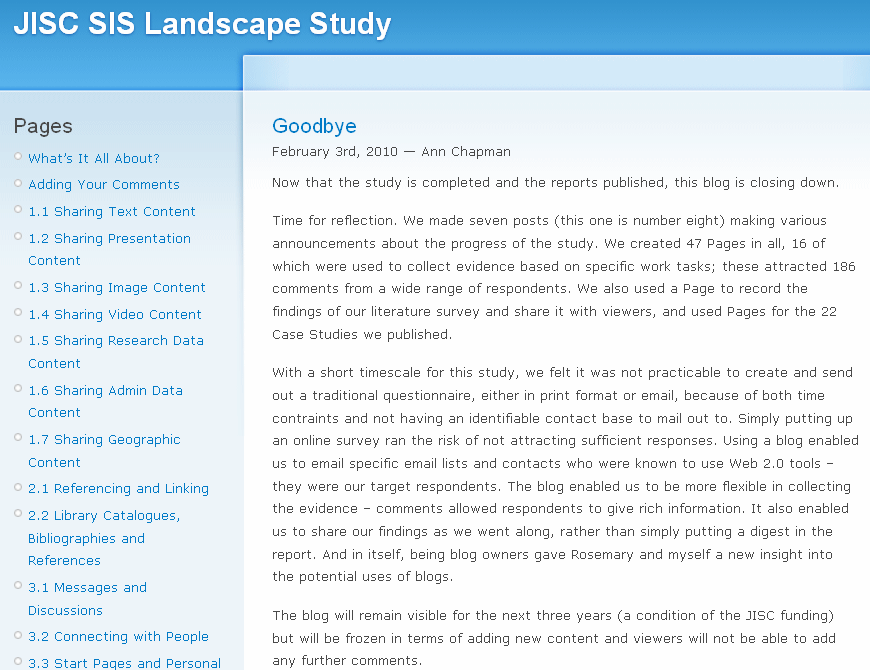Closing Down Blogs
Closing Down Blogs
There may be times when there is no longer effort available to continue to maintain a blog. There may also be occasions when a blog has fulfilled its purpose. In such cases there is a need to close the blog in a managed fashion. An example of a project blog provided by UKOLN which was closed in such a managed fashion after the project had finished is the JISC SIS Landscape Study blog. The final blog post [1] is shown below.

Figure 1: Announcement of the Closure of the JISC SIS Landscape Study Blog
The blog post makes it clear to the reader that no new posts will be published and no additional comments can be provided. Summary statistics about the blog are also provided which enables interested parties to have easy access to a summary showing the effectiveness of the blog service.
Reasons For Blog Closure
Blogs may need to be closed for a number of reasons:
- The blog author(s) may find it too time-consuming to continue to maintain a blog or to find ideas to write about or the initial enthusiasm may have waned.
- The blog author(s) may have left the organisation or have moved to other areas of work.
- The blog may not be providing an adequate return on investment.
- A blog may be withdrawn due to policy changes of managerial edict.
- The original purposes for the blog may no longer be relevant.
- Funding to continue to maintain the blog may no longer be available.
Prior to managing the closure of a blog it is advisable to ensure that the reasons for the closure of the blog are well understood and appropriate lessons are learnt.
Possible Approaches
A simple approach to closing a blog is to simple publish a final post giving an appropriate announcement, possibly containing a summary of the achievements of the blog. Comment submissions should be disabled to avoid spam comments being published. This was the approach taken by the JISC SIS Landscape Study blog [1]. [1].
A more draconian approach would be to delete the blog. This will result in the contents of the blog being difficult to find, which may be of concern if useful content has been published. If this approach has to be taken (e.g. if the blog software can no longer be supported or the service is withdrawn) it may be felt desirable to ensure that the contents of the blog are preserved.
Preserving the Contents of the Blog
A Web harvesting tool (e.g. WinTrack) could be used to copy the contents of the blog’s Web site to another location. An alternative approach would be to migrate the content using the log’s RSS feed. If this approach is taken you should ensure that an RSS feed for the complete content is used. A third approach would be to create a PDF resource of the blog site. Further advice is provided at [2].
References
- Goodbye, JISC SIS Landscape Study blog, 3 Feb 2010,
<http://blogs.ukoln.ac.uk/jisc-sis-landscape/2010/02/03/goodbye/> - The Project Blog When The Project Is Over, UK Web Focus blog, 15 Mar 2010
<http://ukwebfocus.wordpress.com/2010/03/15/the-project-blog-when-the-project-is-over/>
Filed under: Blogs, Needs-checking
